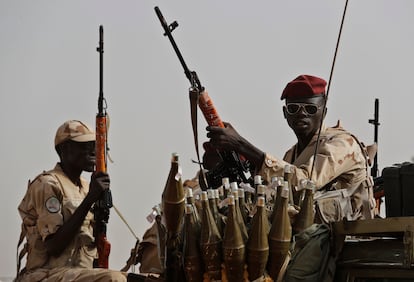Colombian mercenaries recruited to fight alongside paramilitaries in Sudan’s civil war
Dozens of former soldiers, hired through private security companies, are fighting for the Rapid Support Forces against the regular army in one of the bloodiest current conflicts

The news, as strange as it is alarming, has caused many in Colombia, a country mired in internal conflict, to focus their attention on the civil war in Sudan, a battle that has caused a major humanitarian crisis but which barely makes the front pages of national newspapers. More than 20 Colombians were killed by suicide drones in the Darfur region in the east of the country, according to a report issued last week by the Sudanese army. Everything indicates that they were part of the approximately 300 mercenaries who have been recruited to fight side by side with the paramilitaries of the Rapid Support Forces (RSF), an armed group that has been trying to take control of Sudan for more than a year and a half.
The first reports appeared at the end of November. A video shared on social media showed a man — presumably a soldier in the Sudanese Armed Forces — recording passports and ID cards found in the desert that belonged to several Colombians. It was the first glimpse of a simmering story, which boiled over with the revelation that there are at least 300 Colombians fighting in the war in Sudan, according to independent media La Silla Vacía, based on the testimonies of several former soldiers involved. They claim that there are many who are there against their will and who claim to have been hired to work as guards in Dubai, over 3,300 kilometers (2,050 miles) east of Darfur.
بس انا داير اعرف !"
— YASIN AHMED (@yasin123ah) November 21, 2024
الجوازات كلها مرتزقة من كولومبيا!!
السؤال دويلة الامارات دي دايرة شنو من السودان لدرجة تجند مرتزقة من امريكا اللاتينية !!
يا اخوانا يا ايها الشعب السودانى اقسم بالله المؤامرة كبيرة وكبيرة خالص ،،
وشكرانيين ،،#الدعم_السريع_منظمة_ارهابية… pic.twitter.com/9Aj1m4lTaG
Recruitment is mostly carried out through private security companies, which offer several thousand dollars for short-term work, explains Ulrich Petersohn, an expert on security and mercenary activity. “The last link in the chain are almost always those known in the industry as ‘third-country nationals,’ who come from Colombia, Peru, El Salvador, Somalia, or Nigeria. Without solid passports or money for plane tickets, they are entirely dependent on what the agencies want to do with them,” adds the professor at the University of Liverpool via video call.
These are companies that, on paper, are like any other. They have the proper documentation and present themselves as operators of surveillance services in other countries. “We are no longer talking about large corporations like Blackwater [in the U.S.] or Wagner [in Russia], but about one-person companies in which a retired general registers the business and promotes it through WhatsApp chains,” explains Mario Urueña, an expert in global security at the Universidad del Rosario in Bogotá. They offer ex-military personnel up to five times their retirement salary, which makes the offer very attractive.
Whether deceived or not (Petersohn argues that not all are “idiots” and that many understand the risks), Colombians in Sudan find themselves at a crucial moment in the conflict. For the first time since the start of the civil war, the Sudanese army has gained ground on the paramilitaries in various areas, especially in Khartoum, the capital, which is largely controlled by the RSF. The conflict has caused one of the most serious humanitarian crises in the world: more than 20,000 people have died, according to the UN (other investigations put the figure at 60,000), and over 10 million have been forcibly displaced from their homes.
Colombians are not the only mercenaries fighting in Sudan. The army has denounced that the RSF has mercenaries from neighbouring countries in the Sahel, such as Chad or Niger, in its ranks. International media such as CNN also claim to have found evidence that the Russian organisation Wagner has supplied the paramilitaries with missiles to attack the Sudanese Armed Forces, which are in turn supported by Egypt. One of the main players is the United Arab Emirates, which has denied its role in the conflict despite reports from multiple humanitarian organizations and UN experts of its role in the war.
In spite of a 1989 UN convention banning the recruitment and training of mercenaries, and evidence that this market is still present in wars such as the one in Sudan, Petersohn points out the difficulty, if not the impossibility, of bringing companies or mercenaries to trial. “There are very few examples where contractors have been brought to trial for meddling in foreign conflicts, and that is kind of the point: that there is no accountability,” he admits.
Ban paid military personnel
Faced with this dangerous scenario, in which dozens of Colombians find themselves, President Gustavo Petro has assured that it is a practice that must be prohibited. “The military must have a better standard of living in Colombia, but the owners of young blood spilled for money in foreign countries must be criminally punished,” he indicated on X.
In turn, Foreign Minister Luis Gilberto Murillo regretted the participation of his fellow countrymen in the conflict during a call with his Sudanese counterpart and promised to guarantee the return of those citizens who are still in combat, according to a statement from the Sudanese Ministry of Foreign Affairs cited by the Turkish agency Anadolu. During a trip this week to Doha, the capital of Qatar, Murillo told EFE that he hopes to recover the bodies of the Colombians who have already died.
The Colombian government has pushed through Congress a bill that seeks to outlaw organizations “that exploit retired military personnel” by approving the 1989 convention. For Urueña, although the pact is not so widespread — barely 30 countries have signed it — it is an “intelligent proposal that goes in the right direction, which is to criminalize the leaders who exploit people.”
Although Sudan is where cases of Colombian mercenaries have been most recently recorded, retired military personnel have participated for hire in conflicts such as those in Yemen, Iraq, or Afghanistan. One of the most cited events concerning this activity is the assassination of Haitian President Jovenel Moïse in 2021, who was killed in an operation in which about 20 Colombians participated, several of them former military personnel.
Sign up for our weekly newsletter to get more English-language news coverage from EL PAÍS USA Edition
Tu suscripción se está usando en otro dispositivo
¿Quieres añadir otro usuario a tu suscripción?
Si continúas leyendo en este dispositivo, no se podrá leer en el otro.
FlechaTu suscripción se está usando en otro dispositivo y solo puedes acceder a EL PAÍS desde un dispositivo a la vez.
Si quieres compartir tu cuenta, cambia tu suscripción a la modalidad Premium, así podrás añadir otro usuario. Cada uno accederá con su propia cuenta de email, lo que os permitirá personalizar vuestra experiencia en EL PAÍS.
¿Tienes una suscripción de empresa? Accede aquí para contratar más cuentas.
En el caso de no saber quién está usando tu cuenta, te recomendamos cambiar tu contraseña aquí.
Si decides continuar compartiendo tu cuenta, este mensaje se mostrará en tu dispositivo y en el de la otra persona que está usando tu cuenta de forma indefinida, afectando a tu experiencia de lectura. Puedes consultar aquí los términos y condiciones de la suscripción digital.









































